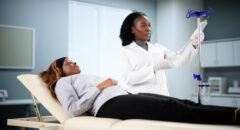
Strokes are the fifth leading cause of death in the United States. However, the numbers are far from equal when ethnicity is considered. In fact, African Americans are far more likely to have a stroke than any other race. Though this is well known, it’s still shocking how little Black people know about their risk of having a stroke and the symptoms that indicate a cause for concern.
What The Numbers Have To Say
Recent statistics show that over 50% of African Americans are likely to have a stroke when compared to other ethnicities. Of those who develop the condition, more than 70% of them will die.
When assessing the risks of a stroke, researchers found that Black men were at a slightly higher risk than women but both genders should be concerned about their risk factors. More than 2 of every 5 men are at risk of having a stroke while 2 in 5 women have the same level of risk.
That discrepancy could be attributed to the fact that 7 in 10 Black men are dealing with obesity, 1 in 5 smoke, and 1 in 9 have been diagnosed with diabetes. With women, 3 in 5 are dealing with obesity and 1 in 7 smoke. In both cases, 2 in 5 African Americans have been diagnosed with high blood pressure and 1 in 365 Black children are born with sickle cell disease. All of these numbers add up to an increased likelihood of strokes that is hard to ignore.
RELATED: Spot Signs and Symptoms of a Stroke F.A.S.T.
What African Americans Think Stroke Symptoms Look Like
There’s another number that you need to know too. Despite the higher risk, studies show that up to 60% of African Americans who were surveyed didn’t know enough about the symptoms of a stroke.
In these studies, people were likely to suspect a stroke if they or someone they knew was dizzy or having chest pain. However, headaches, slurred speech, or sudden trouble with balance weren’t as easily identified.
Since the signs of a stroke can vary, it’s important to know what to look out for. Women, in particular, need to be cautious as they might not have the same striking symptoms as men.
Here are some of the issues you should know so you can get help quickly. People who are having a stroke can experience drooping in the face, numbness or weakness in one arm, slurred speech, trouble speaking or understanding speech, loss of balance, or a sudden headache.
RELATED: How Plant-Based Fats Can Lower Your Risk of Stroke
How You Can Reduce Your Risk
Some of the issues that can influence your risk of a stroke, such as sickle cell disease, may be out of your control but there are other steps you can take.
If you smoke, it’s a good idea to quit because the chemicals in cigarettes have been shown to damage your arteries.
Those who think they’ll have trouble quitting should talk to their doctor about their options for doing so safely.
Reducing alcohol consumption is another recommendation you should consider as it typically increases the level of triglycerides in the blood, which in turn hardens the arteries.
Finally, you should exercise regularly and eat healthily. A typical heart-healthy diet will have fewer foods that are overly processed, high in fat, high in added sugar, and high in salt.
Instead, you should have a balanced diet of lean proteins, whole grains, fatty fish, fresh fruits, vegetables, nuts, and healthy fats.
If you have food sensitivities or allergies, it’s best to consult with your doctor about different ways to tweak your diet.
Though African Americans are generally diagnosed with risk factors that lead to strokes more often than other ethnicities, they don’t know as much about the issue as they should. While you’re managing to reduce your risk, it’s imperative to know the symptoms so you can act quickly. Health experts also advise being up to date with your doctor’s visits so they can pick up on any changes in your health.









